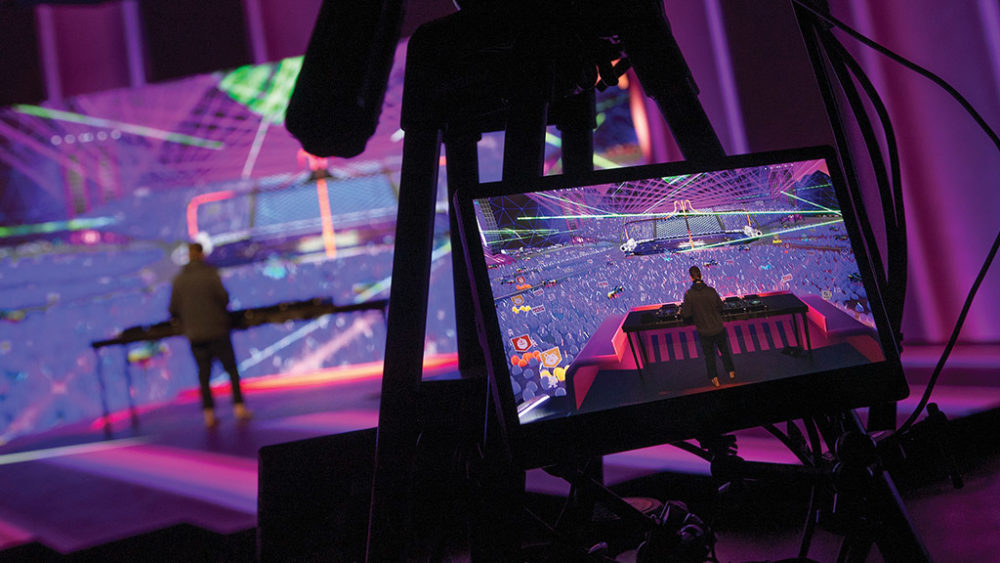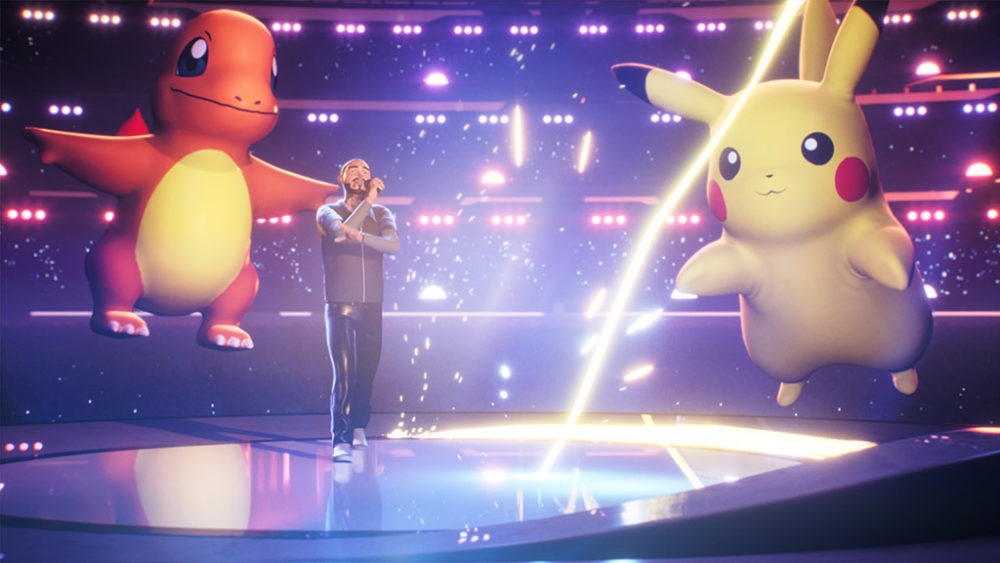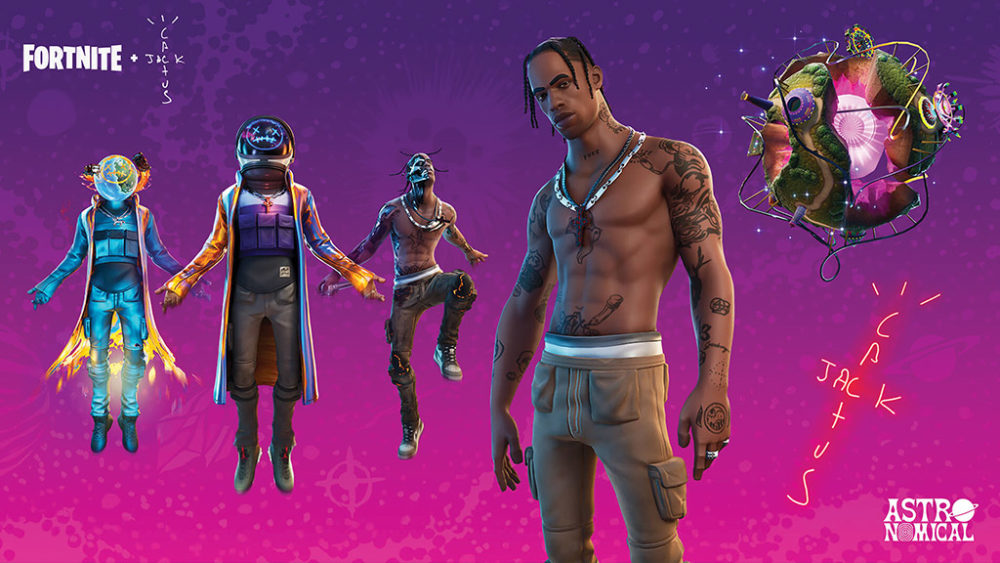
It was April of 2020, the world was reeling, and 12 million people gathered for a concert at a time when no one was allowed to gather at all. But the sheer disregard for CDC guidelines did not set off any alarms because the venue was virtual. Rapper Travis Scott’s Astronomical Tour launched for an audience of millions of fans — inside Fortnite: Battle Royale.
Travis Scott’s Astronomical Tour was not the first in-game concert. It wasn’t even the first Fortnite in-game concert — that honor went to DJ Marshmello, whose 2019 show had a paltry 11 million players in attendance a year earlier in 2019. It was, however, the launchpad for what quickly went from phenomenon to established genre: the in-game concert. From Minecraft to Pokémon to Club Penguin, artists excited by unencumbered creative freedom and fans hungry for interaction and entertainment came together in virtual spaces to celebrate in the one part of the world that COVID-19 could not touch.
The forms the virtual concerts took varied widely. Some, like Post Malone’s event for Pokémon’s 25th anniversary, were fully produced theatrical experiences with motion-captured artists, animated special effects, and magical interactions with game characters in a preproduced movie that fans could tune in to watch premiere. Others, like Soccer Mommy’s Club Penguin Concert or 100 GECS’s concert in Minecraft, were in-game gatherings — a stage built in the middle of the world with character avatars gathering on a server to jam out together as music played. The Fortnite concerts were often both: a dedicated server for players to gather in real time to witness a prerecorded, animated concert event. Regardless of the format, the concerts served as momentary respites from a world much in need of them, even if that often wasn’t the intent in the first place.
“It was always, always intended to be virtual,” says JC Smith, senior director of marketing for The Pokémon Co. “The philosophy that we put in when we started planning back in 2019 was we wanted to create a way for people to celebrate together worldwide. COVID-19 made it even more essential. But the reality was that’s kind of what we always like to do before we launch all our games.”
Smith and his team have been busy this year. Pokémon has released a series of special performances and music videos in celebration of its 25th birthday with artists like J. Balvin and Katy Perry, plus the company released New Pokémon Snap on the Nintendo Switch, with three more games in the pipeline. But it was important for Pokémon’s lead-off event to be one that gave its fans worldwide a chance to celebrate together, and a virtual format was the solution. “We’d like all our fans to be able to enjoy experiences together at the same time around the world,” Smith adds, “so we went into this from the get-go saying what day, where, and let’s make a great experience for them.”
The fact that the answer to “what day” ended up being “in the middle of an unprecedented pandemic” was, improbably enough, a blessing in disguise. It was one of those odd COVID-necessitated developments, like flu cases being at their lowest level in history or restaurants raising their wages because workers refused to return without higher standards of treatment, that make you go, “Wait a minute, should we just keep doing it like this forever?”
2020 and 2021 have undeniably changed the landscape of gaming and the gaming community, maybe permanently. More people are gaming than ever before, and for different reasons. Facebook’s annual report of Games Marketing Insights found that there were 28 million new gamers in the U.S. in 2020. Out of those new gamers, 50% said they made gaming with friends online a part of their weekly routine, and 41% said they went out of their way to attend limited-time events, compared to 36 and 33 percent, respectively, for existing gamers. This new COVID generation of gamers is hungry for interaction and excited by spectacle — a combination that would seemingly ensure that the virtual concert will not fade away even as in-person concerts begin to make their triumphant return.

“From the brand’s perspective, it’s nice to have a colorful, playful way to express your partnership,” says Smith, “so to do a sponsorship of a concert or a television commercial, it’s not the same level of immersion and fun, really. For us, it was an opportunity to say, ‘How could we have fun and make this an enjoyable experience for everyone?’ That’s something people haven’t done in this way. Let’s do something fun and unique and get some stock value.”
The increase in eager gamers isn’t the only driving force behind this trend — it’s also being pushed by a growing generation of artists who grew up with video games, and are open to and excited by the idea of making their marks on those worlds. Travis Scott’s performance in Fortnite may have been prerecorded, but he was still in attendance as a fan, watching in the audience with everyone else while streaming on Twitch. For Scott, who has always been a showman, the ability to transcend the real world — and real world physics — was a major selling point for his participation. “We can fly; we can do all of these things,” Scott said in an interview with Billboard Magazine. “That’s what gets me amped, you know what I’m saying? The fantasies I would think of, to see it all come alive, so people can see and experience it, too.”
For Smith, who’s worked with Pokémon for 15 years, it was both surprising and heartening to see how much the artists they’ve brought in for in-game projects enjoyed the chance to work with games they’d grown up playing. “We’re very, very blessed by the longevity of the brand and the fact that we’ve entertained people for as long as we have,” Smith says, “because it does make it easier to say, ‘Hey, would you like to partner with Pokémon?’ They don’t say, ‘What’s that?’ They say, ‘What? How??’ And then we’re off to the races.”
“This new COVID generation of gamers is hungry for interaction and excited by spectacle — a combination that would seemingly ensure that the virtual concert will not fade away.”
That obvious joy on the performer’s side is another facet of this still nascent genre of performance that makes it feel like it’s here to stay. If you watch any of these performances on YouTube, the fun that the artists are having — a giant Lil Nas X dancing along to “Old Town Road” in a saloon in Roblox, Travis Scott slowly sinking through the sea as players swim around him, Post Malone strutting across the stage as Pokémon swirl on all sides — there’s a distinct amount of, pardon the cliché, childlike wonder to the performance. It’s understandable! Few of us can say that we grew up dreaming of one day headlining Bonnaroo, but who didn’t have a moment when they wished they could be in a video game?
The virtual space and its unlimited capacity carries with it another important benefit that the real world can’t always match: improved accessibility. In-person concerts and music festivals are prized at times for their exclusivity — it’s cool to be able to pay thousands of dollars to spend a week in a tent in the desert, but it’s not feasible for many to do so. The virtual concert removes those barriers, giving anyone with a phone, computer, or gaming device access. There are still barriers to consider and overcome, like live-captioning for hard-of-hearing communities, but the idea of a star-studded concert that you can attend front-row-center from the comfort of your bedroom is one that turns the frequently ableist concert industry toward a much more promising future.

Of course, performing is a business, and it’s impossible to discuss the boom in virtual concerts without talking about the resulting boom in the hastily erected virtual concert industry. Video games give merchandisers and marketers access to a coveted demographic of young, brand-loyal fans, and the immediacy of a concert or performance further emphasizes that. While you may not feel particularly inclined to buy a Travis Scott T-shirt on any random day, who doesn’t love band merch after seeing a show? And what merch designer doesn’t love selling a band T-shirt to 45 million people?
For brands like Pokémon and Fortnite, these events provide unique opportunities to create merch based on special events outside of the typical parameters or storylines of the games. “For us, if you create something that people want to express, they want to show off they were part of, it’s natural, right?” Smith opines. “It’s like, you go to a concert, you want to have a concert tee to some degree. You may not wear it until it’s cool to do so — you don’t wear it the day after — but you still buy it and you want to wear it when it is the appropriate time because people want to say, ‘Hey, I was there.’”
The physical remnants of the shows are still findable: You can purchase an Astronomical Tour T-Shirt with Travis Scott’s Fortnite avatar on it, or a hoodie with Pikachu and Katy Perry emblazoned across the gray front. The results of millions of viewers being tuned into an artist’s music is tangible, too, and you can easily track where an artist’s virtual appearance in a game corresponds with a sudden push of their songs onto the Billboard charts. But the real impact of these events — the creation of a global concert space that casts aside concerns about affordability, accessibility, and immediacy — is still just beginning to come into view. “This is something that crosses lots and lots of borders,” Smith says, “and we’re really enjoying the conversations that we’re having with artists all over the world.”
As vaccine numbers continue to go up and the threat of COVID-19 begins to gradually recede, the world will slowly begin to return to its old habits and practices. But we are still far from out of the woods, and even when we do reach a point when we can truly feel safe again, there are some things created this past year that may long outlive the virus that spawned them. In-game concerts, it seems, could very well be one of them. As the gaming community continues to grow and more virtual shows prove that the format is a success that brings millions of fans together, the virtual concert will only grow larger and more fantastic — and all fans have to do is plug in our headsets, add some friends, log onto our favorite server, sit back, and watch.
This article was originally published in Issue No. 10 of the Pop Insider. Click here to read the full issue!
